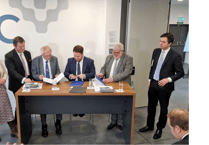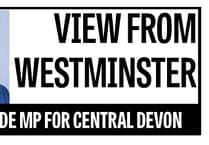HAVING a large and growing economy matters not just absolutely but relatively. It is crucial for a country’s economy to be significantly larger than its debt. If it is not, debt becomes very expensive to service.
Without a strong economy we also become less attractive to invest in as a country and to work in. Without attracting that investment to create new businesses and new jobs, living standards fall – for everyone. Without growth, which also increases tax take, we will not be able to invest in our public services to improve them. That is why growing the economy is one of the Prime Minister’s five pledges.
There are many solutions that can be deployed to help us reach this target. The Chancellor has focused minds around four pillars, or the four “Es”: enterprise, education, employment and everywhere.
The Chancellor’s Spring Budget incentivised investment, creating 12 new investment zones, fully expensing investment in IT equipment, plant, and machinery and supporting research and development intensive small and medium enterprises with additional cash.
30 hours of free childcare for all under 5s, will provide the wraparound care needed to remove barriers that previously prevented people from working when they wanted to. These are all positive steps to get our economy growing, boosting demand in the short-term and supply in the medium term, reducing borrowing by £3billion next year, and substantially increasing employment.
But at the root of a successful society are families who feel secure and able to make decisions about employment which are in their families’ best interests. Happy employees are more productive. Our tax system in the UK does not support that choice. For the most part everyone is taxed as an individual.
Family life is costly and the family that choses to have one parent at home devoted to bringing up their children is making an expensive choice. The transferable tax allowance for married couples, introduced in 2015, looked to provide a family-friendly tax incentive – allowing one spouse to transfer £1,260 of their personal income tax allowance to the other spouse. However, this only applies to couples who marry.
Expanding this allowance to unmarried cohabiting couples who are raising children could add some additional cash into families’ pockets which really matters in the current economic climate. Perhaps we could go further.
The Centre for Policy Studies has suggested the marriage allowance could be made fully transferable. Instead of only allowing £1,260 to be transferred, 100% of unused personal allowance could be transferable with no income restrictions unless the household contains a higher rate tax payer. The allowance has only ever been available to basic rate tax payers.
But changing the eligibility criteria and the amount available would need to be accompanied by a drive for uptake of this allowance. Current uptake of the allowance is desperately low, and if we want policy changes to be meaningful, we need to look at how easy and accessible they are. Government information campaigns are, therefore, a must.
Signposting the allowance to those who are welcoming new babies into their family or those people getting their marriage certificate would be key. Reforming our tax system to incentivise the proven positives of strong family foundations giving families real choices about bringing up their children is something that could have a dual benefit on family life in the current economic climate – both financially and by delivering better health outcomes.
When we get back to Westminster in September, we will be on the run up to the Autumn Statement. The Chancellor has set us on the right path and steadied the ship, sticking to the plan is a must. But supplementing the childcare reforms delivered in the spring with family-friendly tax incentives, could both help families and improve productivity as we seek to meet the Prime Minister’s target of growth.
► We have surgeries in Newton Abbot on August 17 and Kingsteignton on August 25. These will be by appointment only. If you would like to book a surgery appointment, please call my office on 01626 368277 or email [email protected] to arrange an appointment.




